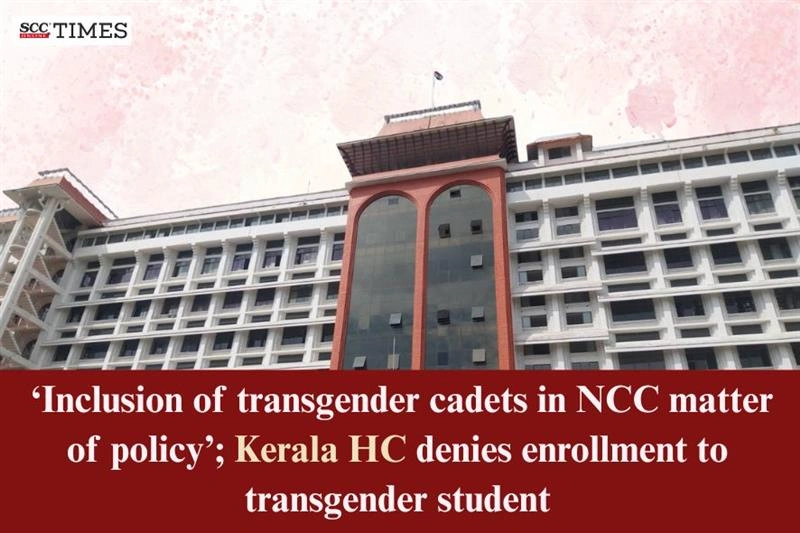Kerala High Court: While deciding whether the rejection of a transgender student’s application for enrollment in the National Cadet Corps (‘NCC’) was unconstitutional, a Single Judge Bench of N. Nagaresh, J., dismissed the petition and held that the inclusion of transgender students in NCC is a matter of policy and the existing statutory framework under the National Cadet Corps Act, 1948 (‘NCC Act’), does not contemplate a separate division for them.
Background:
The petitioner was a transgender student who had applied for enrollment in the 30(K) Bn, National Cadet Corps, Calicut Group. He satisfied all eligibility conditions but during the interview process he was informed that his enrollment in NCC was not permissible as he was a transgender.
The petitioner contended that his candidature was rejected based on gender identity which was violative of his fundamental rights guaranteed under Articles 14, 15, 19 and 21 of the Constitution. However, the respondents argued that Section 6 of the NCC Act only has provision to enroll male and female cadets only, and its scheme does not provide for a transgender division.
Analysis and Discussion:
The Court opined that the NCC aims at developing character, comradeship, discipline, the spirit of adventure and ideals of selfless service among young citizens. It is intended to create a pool of organised, trained and motivated youth with leadership qualities in all walks of life, who will serve the nation regardless of the career they choose.
The Court noted that the NCC follows a curriculum and training methodology closely mirroring that of the Armed Forces. The NCC training involves close contact, physical exercises, long and short camps where cadets stay in the field, confined accommodation, etc., where the gender of the cadet is an important aspect. Therefore, NCC follows a gender-specific enrollment.
The Court observed that there is no comparable provision for transgenders in the NCC Act, and therefore, a transgender student cannot be enrolled in NCC Divisions. The Court remarked that it is true that candidates belonging to transgender section stand to lose in the matter of enrollment in NCC and ideally, they should also get the opportunity to enroll in NCC, but the question is, taking into consideration the statutory provisions and the purpose for which the gender specific divisions are maintained for students, the existing provisions can be said to be violative of Article 14 of the Constitution or not.
The Court observed that, given the circumstances of the case, there is intelligible differentia in providing differential treatment in NCC for persons belonging to different genders. The NCC Act does not contemplate an NCC Division for transgenders. The Court opined that ideally, transgender students should also get equal opportunity to get NCC training, but the formation of NCC Transgender Division would require enough transgender students. The Court observed that these were matters of policy requiring sufficient studies, which was the function of the Executive. Further, the implementation of Transgender Divisions in NCC would also require legislative intervention.
Consequently, the Court dismissed the petition but directed to forward the judgment’s copy to the Secretaries of Ministry of Defence and Ministry of Law and Justice, Government of India, for consideration of the issue and action.
[Janvin Cleetus v. Union of India, 2025 SCC OnLine Ker 12244, decided on 13-11-2025]
Advocates who appeared in this case:
For the Petitioner: Dhanuja M.S., Advocate.
For the Respondents: Dayasindhu Shreehari N.S. (Senior Panel Counsel), Dheeraj A.S. (Government Pleader).



